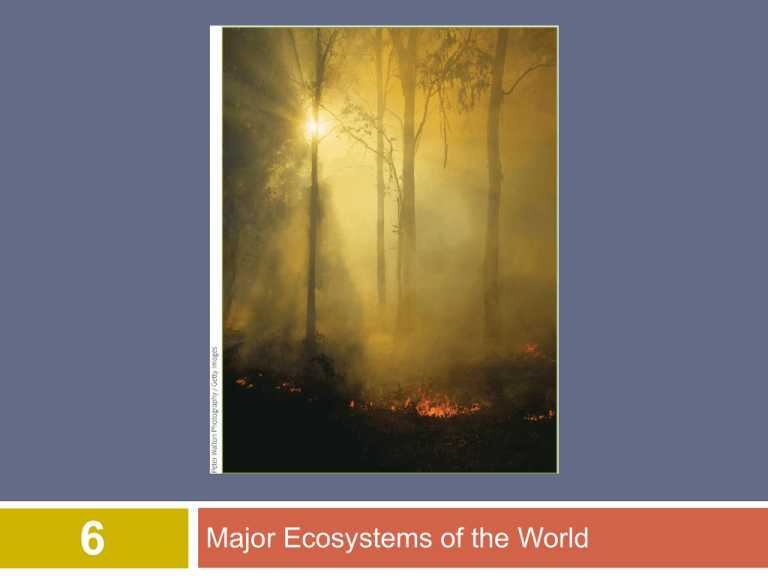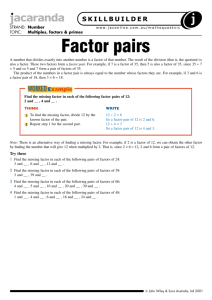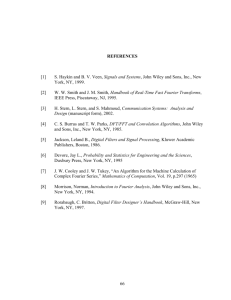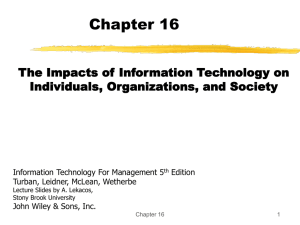
6
Major Ecosystems of the World
Overview of Chapter 6
Earth’s Major Biomes
Aquatic Ecosystems
Freshwater
ecosystems
Estuaries
Marine
Ecosystems
© 2015 John Wiley & Sons, Inc. All rights reserved.
Wildfires and Ecosystems
Wildfire –unexpected fire in grass, shrub, or
forests
Understory
needs to dry for prolonged period (i.e.
dry season)
Many plants need or have
adapted to fire
Some
seeds need fire to
sprout
Cleans out understory
Altered wildfire regime
changes forests
© 2015 John Wiley & Sons, Inc. All rights reserved.
Earth’s Major Biomes
Earth has many climates and characteristics
organisms have adapted forming biomes
Biome
A large, relatively distinct terrestrial region with a
similar climate soil, plants, and animals, regardless of
where it occurs in the world
Nine major biomes
Location of each biome is primarily determined
by:
Temperature (varies with both latitude and elevation)
Precipitation
© 2015 John Wiley & Sons, Inc. All rights reserved.
Distribution of Terrestrial Biomes
1.
Tundra
2.
Boreal forest
3.
Temperate rain
forest
4.
Temperate
deciduous forest
5.
Temperate
grassland
6.
Chaparral
7.
Desert
8.
Savanna
9.
Tropical
rainforest
© 2015 John Wiley & Sons, Inc. All rights reserved.
© 2015 John Wiley & Sons, Inc. All rights reserved.
Tundra
Arctic or alpine tundra
Treeless biome in the far north with harsh, cold
winters and extremely short summers
Precipitation
10–25 cm/yr
Temperature
Short growing season
50–160 days
© 2015 John Wiley & Sons, Inc. All rights reserved.
Tundra
Nutrient poor soils with little organic material
Permafrost
present
Low species richness
Vegetation
is mostly
grasses and sedges
Very simple food
web
Low primary
productivity
© 2015 John Wiley & Sons, Inc. All rights reserved.
Boreal Forests (Taiga)
A region of coniferous forests in the northern
hemisphere
Just
south of tundra
Covers 11% of land
Growing Season
A
little longer than
tundra
Precipitation
~
50 cm/yr
© 2015 John Wiley & Sons, Inc. All rights reserved.
Boreal Forests
Soils are acidic and mineral poor, patchy
permafrost
Vegetation comprised of drought resistant
conifers
White
spruce
Balsam fir
Eastern larch
Mostly small animals
and migrating birds
Some large animals
are present (caribou,
moose)
© 2015 John Wiley & Sons, Inc. All rights reserved.
Temperate Rainforest
Coniferous biome with cool weather, dense fog
and high precipitation
Ex:
Northwest U.S.
Precipitation
>
127 cm/yr
Heaviest in winter
Temperature
Winters
are mild
Summers are cool
© 2015 John Wiley & Sons, Inc. All rights reserved.
Temperate Rainforest
Soils are nutrient-poor, but high in organic
material (dropped needles)
Cool temperatures slow decomposition
Dominant Vegetation
Large evergreen trees
Old-growth forest
Variety of cool
climate animal life
Very high species
richness
© 2015 John Wiley & Sons, Inc. All rights reserved.
Temperate Rainforest
Heavily logged
When logged,
replanted as
monoculture
Does not undergo
succession to oldgrowth forest
Harvested in 40-100
year cycles
Many endangered
species live in oldgrowths
© 2015 John Wiley & Sons, Inc. All rights reserved.
Temperature Deciduous Forests
Forest biome that occurs
in temperate areas with a
moderate amount of
precipitation
Precipitation
75–150
cm/yr
Temperature
Seasonality
Hot
summers and cold
winters
© 2015 John Wiley & Sons, Inc. All rights reserved.
Temperate Deciduous Forest
Topsoil is rich in organic material and underlain
by clay
Vegetation is primarily
deciduous
Animals
Oak, maple, beech
Deer, bear, and small animals
Most of biome has been
regenerated after farming and
timber harvest
© 2015 John Wiley & Sons, Inc. All rights reserved.
Grassland
Grasslands with hot summers, cold winters
and too little precipitation to support trees
Precipitation
25–75
cm/yr
Tall grass prairies
Short grass prairies
90% of this biome has
been lost to farmland
© 2015 John Wiley & Sons, Inc. All rights reserved.
Grassland
Soil has thick, organic material rich organic horizon
Periodic fires prevent tree and shrub growth
Animals
Once covered
with bison - no
longer
Smaller
animals are still
present (ex:
prairie dogs)
© 2015 John Wiley & Sons, Inc. All rights reserved.
Chaparral
Also called a
Mediterranean Climate
Ex:
Southern California
Ex: Greece
Temperature
Mild,
moist winters
Hot, dry summers
Frequent fires
© 2015 John Wiley & Sons, Inc. All rights reserved.
Chaparral
Soil is thin and often not fertile
Vegetation
Dense
growth of
evergreen shrubs
Lush during the
growing season
Animals
Mule
deer,
chipmunks, many
species of birds
© 2015 John Wiley & Sons, Inc. All rights reserved.
ENVIRONEWS
6000 wildfires each year in California
Goats as a means to fight wildfires
350
goats denude an acre of brush per day
As part of a plan, goats can be a tool for forest
and property protection
© 2015 John Wiley & Sons, Inc. All rights reserved.
Deserts
Biome where lack of
precipitation limits
plant growth
Temperature
Can
very greatly in 24hr period, as well as
yearly (based on
location)
Precipitation
<
25 cm/yr
© 2015 John Wiley & Sons, Inc. All rights reserved.
Deserts
Soils low in nutrients and
high in salts
Vegetation sparse
cactus
and sagebrush
Animals are very small to
regulate temperature
© 2015 John Wiley & Sons, Inc. All rights reserved.
Savanna
Tropical grassland with
widely scattered trees
Temperature
Varies
little throughout
the year
Precipitation
Seasons
regulated by
precipitation, not
temperature
76-150 cm/yr
© 2015 John Wiley & Sons, Inc. All rights reserved.
Savanna
Soil low in nutrients due to leaching
Vegetation
Wide
expanses of grass, occasional Acacia trees
Have fire adaptive
characteristics
Animals
Herds of hoofed
animals
Large predators lions, hyenas, etc.
© 2015 John Wiley & Sons, Inc. All rights reserved.
Tropical Rainforest
Lush, species-rich biome
that occurs where
climate is warm and
moist throughout the
year
Precipitation
200–450
cm/yr
Very productive biome
Most species-rich biome
© 2015 John Wiley & Sons, Inc. All rights reserved.
Tropical Rainforest
Ancient, weathered, nutrient-poor soil
Nutrients
tied up in vegetation, not soil
Vegetation
3
distinct canopy
layers
Animals
Most
abundant
insect, reptiles
and amphibians
on earth
© 2015 John Wiley & Sons, Inc. All rights reserved.
Vertical Zonation
Increasing in elevation has similar effect on
ecosystem as traveling to higher latitudes
© 2015 John Wiley & Sons, Inc. All rights reserved.
Aquatic Ecosystem
Fundamental Division
Freshwater
Saltwater
Aquatic Ecosystems also affected by
Dissolved oxygen level, light penetration, pH,
presence/absence of currents
Three main ecological categories of organisms
Plankton- free floating
Phytoplankton – photosynthetic
Zooplankton – animal-like
Nekton - strong swimming
Benthos - bottom dwelling
© 2015 John Wiley & Sons, Inc. All rights reserved.
Freshwater Ecosystems
Includes:
Rivers
and streams (lotic or flowing waters)
Lakes and ponds (lentic or standing water)
Marshes and swamps (standing water)
Represent 2% of earth’s surface
Assist in recycling water back to the oceans
© 2015 John Wiley & Sons, Inc. All rights reserved.
Rivers and Streams
Headwater
streams
Larger streams and
rivers
© 2015 John Wiley & Sons, Inc. All rights reserved.
Rivers and Streams
Estuaries,
deltas, coastal
ocean
Physical nature of
aquatic
ecosystems
changes
significantly
© 2015 John Wiley & Sons, Inc. All rights reserved.
River continuum concept
Water moves from headwaters to rivers to
coastal ocean
Change
in physical features and food sources
(abiotic differences)
Results in change in biological features and
ecosystem function
In streams, organisms adapted to fast flowing
water (hooks, suctions, flattened bodies)
In rivers, adaptation for swimming
(streamlined)
© 2015 John Wiley & Sons, Inc. All rights reserved.
Lakes and Ponds
Body of freshwater that does not flow
Three zones
Littoral
Limnetic
Profundal
Experience thermal stratification (depending
on depth)
© 2015 John Wiley & Sons, Inc. All rights reserved.
Lakes and Ponds
Littoral Zone - shallow water area along the shore
Limnetic Zone - open water beyond the littoral
zone
Profundal Zone - beneath the limnetic zone of
deep lakes
© 2015 John Wiley & Sons, Inc. All rights reserved.
Thermal Stratification
Temperature changes
sharply with depth
Thermocline
Temperature transition
between warmer
surface water and
colder water at depth
(difference in density)
Only present in warm
months
© 2015 John Wiley & Sons, Inc. All rights reserved.
Fall Turnover
© 2015 John Wiley & Sons, Inc. All rights reserved.
Marshes and Swamps
Land with shallow, fresh water for at least part
of the year
Characteristic soil and
vegetation
Were once regularly
filled
More recently,
ecosystem services
have been better
recognized
Flood protection, water
filtering, etc.
© 2015 John Wiley & Sons, Inc. All rights reserved.
Protection of ecosystem
(organism) services
© 2015 John Wiley & Sons, Inc. All rights reserved.
The Everglades
Original extent
Today, after extensive
construction and draining
of wetlands
© 2015 John Wiley & Sons, Inc. All rights reserved.
Estuaries
Where freshwater and saltwater mix
Highly variable environment
Temperature, salinity, depth of light penetration
Highly productive
Nutrient transported from land
Tidal action circulates
High level of light penetrates shallow water
Plants provide photosynthetic carpet
© 2015 John Wiley & Sons, Inc. All rights reserved.
Salt marshes
Usually in temperate estuaries
Shallow wetlands dominated by a few species
of salt-tolerant grasses
Were
seen as worthless, filled in, and constructed
over
Services are extensive
Buffer
land from storm energy (Superstorm Sandy)
Large cycling of organic matter for coast
Habitat (particularly birds)
© 2015 John Wiley & Sons, Inc. All rights reserved.
Mangrove forests
Tropical equivalent of salt marshes
Should cover >70% of coastlines
Services
Buffers storm energy
(saves lives)
Nurseries for fish and
organisms
© 2015 John Wiley & Sons, Inc. All rights reserved.
Marine Ecosystems
Subdivided into life zones
Intertidal
zone
Benthic zone
Pelagic environment
Neritic
Province
Oceanic Province
© 2015 John Wiley & Sons, Inc. All rights reserved.
Marine Ecosystems
© 2015 John Wiley & Sons, Inc. All rights reserved.
Intertidal Zone
Area of shoreline between low and high tide
Biologically productive habitat
Stressful habitat
Splash
zone
Wave action
Flooding
Drying out
© 2015 John Wiley & Sons, Inc. All rights reserved.
Benthic Zone
Ocean floor, extending from tidal zone to deep
sea trenches
Sediment is mostly mud
Burrowing
worms and clams
Three zone
200m – 4000m deep
Abyssal: 4000m – 6000m deep
Hadal: 6000m – bottom of deep sea trenches
Bathyal:
© 2015 John Wiley & Sons, Inc. All rights reserved.
Productive Benthic Communities
Seagrass Beds
Present to depth of 10 m
Provide food and habitat to ecosystem
Kelp Forest
60-m long brown algae found off rocky shores
Large Biodiversity
Coral Reefs (essential fish habitat in ocean)
Built from accumulated layers of CaCO3
Colonies of millions of tiny coral animals
Similar to upside down jelly fish
Found in shallow warm water
Most diverse of all marine environments
© 2015 John Wiley & Sons, Inc. All rights reserved.
Productive Benthic Communities
Left: Seagrass Bed
Right: Kelp Forest
© 2015 John Wiley & Sons, Inc. All rights reserved.
Coral Reef Environments
Three types of coral
reefs
Fringing
reef directly attach to
continent- no lagoon
Atoll - circular reef in
a lagoon
Barrier reef separates lagoon
from ocean
© 2015 John Wiley & Sons, Inc. All rights reserved.
Human Impact on Coral Reefs
Sedimentation
From
clear-cutting, coastal construction
Overfishing, destructive fishing
Coral bleaching (stress condition)
Mining of corals as building materials
Runoff and sewage pollution
Ocean acidification and rising sea
temperatures
© 2015 John Wiley & Sons, Inc. All rights reserved.
Pelagic Environment
All the open ocean water
Main divisions based on depth and light
penetration
Euphotic
zone
Surface
to 150m
Sufficient light for photosynthesis
Organisms are all floaters or swimmers
© 2015 John Wiley & Sons, Inc. All rights reserved.
Pelagic Environment
Neritic
Province
Organisms
are floaters or swimmers (zooplankton,
whales)
Water that overlies the continental shelf (to depth of
200m)
© 2015 John Wiley & Sons, Inc. All rights reserved.
Pelagic Environment
Oceanic
Province
Water
that overlies depths greater than 200 m
Organisms are filter feeders, scavengers and predators
No light for photosynthesis, organisms adapted for darkness
Marine snow (food particles falling from euphotic zone) support
some life
Hydrothermal vent
communities in deep
ocean support life
too
© 2015 John Wiley & Sons, Inc. All rights reserved.
National Marine Sanctuaries
Protected areas in
worlds oceans
NOAA administers in
U.S.
“no take” and other
restrictions for use
© 2015 John Wiley & Sons, Inc. All rights reserved.
Human Impacts on the Ocean
© 2015 John Wiley & Sons, Inc. All rights reserved.




